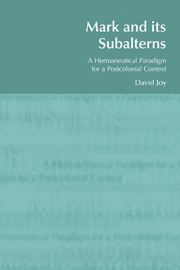Book contents
- Frontmatter
- Contents
- Foreword
- Acknowledgements
- 1 General Introduction
- PART I Hermeneutics: General Methodological Considerations
- PART II Mark – Context and Interpretation
- 4 Colonial Powers and their Marks in Mark
- 5 Mark and its Subalterns: A Product of Conflict and Resistance?
- 6 Mark 10:17–31 in the Light of the Issues of the Poor and their Representation: A Postcolonial Reading
- 7 Mark 7:24–30 in the Light of Race, Gender and Hybridity: A Postcolonial Reading
- 8 Mark 5:1–20 in the Light of the Issues of Class, Nationalism and Subalternity: A Postcolonial Biblical Reading
- 9 General Conclusions: Hermeneutical Issues and Concluding Summary
- Endnotes
- References
9 - General Conclusions: Hermeneutical Issues and Concluding Summary
from PART II - Mark – Context and Interpretation
- Frontmatter
- Contents
- Foreword
- Acknowledgements
- 1 General Introduction
- PART I Hermeneutics: General Methodological Considerations
- PART II Mark – Context and Interpretation
- 4 Colonial Powers and their Marks in Mark
- 5 Mark and its Subalterns: A Product of Conflict and Resistance?
- 6 Mark 10:17–31 in the Light of the Issues of the Poor and their Representation: A Postcolonial Reading
- 7 Mark 7:24–30 in the Light of Race, Gender and Hybridity: A Postcolonial Reading
- 8 Mark 5:1–20 in the Light of the Issues of Class, Nationalism and Subalternity: A Postcolonial Biblical Reading
- 9 General Conclusions: Hermeneutical Issues and Concluding Summary
- Endnotes
- References
Summary
Introduction
This chapter provides a conclusion to this study, its implications in the postcolonial context of India, the limitations of the findings and some suggestions for further research in this line. The result of this study can be summarized in the following way along with some major hermeneutical issues emerging from the deliberations of this thesis. This thesis has considered the Gospel of Mark afresh from a postcolonial perspective. The contributions of past interpreters have been reviewed, focusing on three main areas, namely Markan interpreters, Indian hermeneuts and postcolonial readers of the text. In the light of the contributions of the past interpreters of Mark from various angles of their interpretation, this study has focused more attention on a postcolonial viewpoint. The introduction of the study raised five major questions concerning the identity of the subalterns in Mark, the nature of Roman oppression in Galilee, the Markan milieu, postcolonial dimensions of the text and a possible hermeneutical paradigm for India
Part I, Hermeneutics: General Methodological Considerations paved the way for a creative discussion on Mark and its hermeneuts in the rest of the study. Further, this section dealt with the issue of the spread of Christianity and missionary attempts at biblical interpretation. This part of the study clearly showed that they did not take the issues related to the sociopolitical and religiocultural life of the natives into account when interpreting the Bible. However, there were native voices which stood for indigenization and local systems of religious order.
- Type
- Chapter
- Information
- Mark and its SubalternsA Hermeneutical Paradigm for a Postcolonial Context, pp. 179 - 187Publisher: Acumen PublishingPrint publication year: 2008

